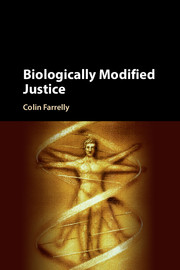Book contents
- Biologically Modified Justice
- Biologically Modified Justice
- Copyright page
- Dedication
- Dedication
- Contents
- Figures
- Preface
- Introduction
- 1 The genetic revolution
- Part I The duty to aid in an ageing world
- 2 Empirical ethics and Singer’s principle of preventing bad occurrences
- 3 The duty to extend the biological warranty period
- 4 Equality and the duty to retard human ageing
- 5 Framing the inborn ageing process and longevity science
- Part II Genetic justice
- Part III Patents, reproductive freedom, and patriarchy
- Bibliography
- Index
3 - The duty to extend the biological warranty period
from Part I - The duty to aid in an ageing world
Published online by Cambridge University Press: 05 June 2016
- Biologically Modified Justice
- Biologically Modified Justice
- Copyright page
- Dedication
- Dedication
- Contents
- Figures
- Preface
- Introduction
- 1 The genetic revolution
- Part I The duty to aid in an ageing world
- 2 Empirical ethics and Singer’s principle of preventing bad occurrences
- 3 The duty to extend the biological warranty period
- 4 Equality and the duty to retard human ageing
- 5 Framing the inborn ageing process and longevity science
- Part II Genetic justice
- Part III Patents, reproductive freedom, and patriarchy
- Bibliography
- Index
Summary
- Type
- Chapter
- Information
- Biologically Modified Justice , pp. 51 - 71Publisher: Cambridge University PressPrint publication year: 2016



